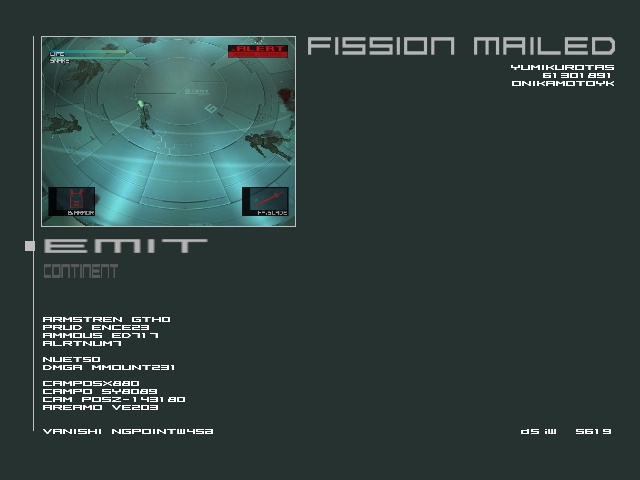Last updated on August 11, 2014
In my Metal Gear Solid review, I described the fourth wall breaking nature of the plot as “postmodern”. But what, exactly, does that mean? Surely, you could go and take a look at a Wikipedia page or other resources, but none of them provide a layman’s explanation of what exactly postmodernism is or means. Partly, that’s because to give something a definition is exactly what postmodernism avoids; on the other hand, accepting it remains pretty unclear in the throes of logical/rational thought for a number of reasons.
Telling people that postmodernism reacts against modernism strikes me as a non-answer. All of these terms refer to a general academic classification of thoughts among a select group of people, or even a generation, and that’s incredibly difficult to define or categorize. If we could categorize modernism by any one factor, it would be Ezra Pound’s dictate of “make it new!”. It rejected the seemingly outdated thought of the past and replaced those ideas with new ideas, not grounded in the old but born entirely of the new. That makes no sense from our perspective, but the latter half of the 19th century felt like a true wave of civilization’s progress in nearly every area; why wouldn’t it continue? This falls in line with Enlightenment thinking, an extension of the rational/logical mindset’s usefulness and application to the world if not its culmination,
And then something changed. We could trace it to any number of events, but the great majority of people, for whatever reason, rejected the absolute autonomy, objectivity, and cold harsh reality of modernism. The postmodernist affirmed, instead, that human categories could not just reveal the veil that hid the mysteries of the universe through reason or human will alone. There was no “objective point” from which to examine and assert; humans cannot step back from their lives, their being, their cultural constructs. Postmodernism met people where they were, not a magical Platonic ideal. You can see two thousand years of Platonic philosophic thought suddenly crumble as the World of Ideas disappears!

And yet, we must make the distinction that a lack of “objectivity” means “subjectivity” takes its place. Both remain human constructs to fit things into a grand metaphysical structure; human life is often built on such easily understandable concepts for the purpose of intelligibility or comfort (notably: TED Talks). We take the assumption that we can know things, and know their very essence, and somehow this happens purely by sense experience and emotions. Postmodernists balk at the hubris of such a notion which does not recognizes the continuous changes in human life and beings who are ever on the move, never sitting in one a priori spot to analyze human life. In a phrase: postmodernism brings fallibility back into the spotlight, recognizes the flaws of human thought and being as they apply to existence, which does not always play by our preconceived rules.
As a result, postmodernists take old ideas out of their original concepts and reshape them in this new perspective. That extends to nearly every field, from scientific inquiry to theology. All of it stems from an attempt to bring human thought back to human action, refusing to separate being and becoming.
How does Metal Gear Solid fit into this particular ideology? Well, take this particular example from Tim Rogers, whose article “Dreaming in an empty room” (which may or may not be trolling, but that’s also pretty postmodern in itself) says this:
Well, I was able to present my ideas to Kojima, who confirmed that I am pretty much right about why he made Metal Gear Solid 2. His goal was, as he explained to me, “To make a videogame that told a story that could only be told in a videogame.” His first and foremost goal, he claims, was to “Use the medium,” which is, as he put it, “inherently postmodern.” The goal of the story the game sought to tell was to tell that story to the people of today, with no illusions of its surviving decades or centuries to leave an impact on a distant society. Even so, the gameplay, as he explains, becomes increasingly more challenging in such a way as to make the experience something round and fulfilling even to the player who skips all of the long, drawn-out dialogue sequences. The gameplay, says the man, was engaging merely because it could not be not engaging under his supervision.
So there’s that! I’ve also written extensively about the bait and switch of Metal Gear Solid 2, so I’ll leave that for another time. Suffice to say that Kojima intends for his games to represent, in some shape or form, a “postmodern” message. Metal Gear Solid games take the tropes of American action movies in the 1980s while turning them on their head; instead of pro-war, they’re anti-war in every sense. Metal Gear Solid likes to turn video game tropes on their head; instead of allowing the player to unconsciously perform the actions the game demands, Kojima chides or even explicitly condemns the player for performing those very actions. Most video games want to present the illusion that they’re not video games; Metal Gear Solid embraces self-awareness, continually breaking the fourth wall to ensure that the player remembers that fact (and also creepily connecting the player to the game on a more intimate level).

Postmodernism isn’t simply reversals, but placing new wine into old wineskins to break them and create something new. It denies that those concepts existed in their ultimate form, and that we can reinterpret them within the continuity of being, rather than a magical, invented distance from human life. While I’m not sure whether I myself fall under the “postmodernist” rubric, I can see the value in its ideas to some degree. Still, I’m not sure whether Jesus thinks so…
33 And they said to Him, “The disciples of John often fast and offer prayers, the disciples of the Pharisees also do the same, but Yours eat and drink.” 34 And Jesus said to them, “You cannot make the attendants of the bridegroom fast while the bridegroom is with them, can you? 35 But the days will come; and when the bridegroom is taken away from them, then they will fast in those days.” 36 And He was also telling them a parable: “No one tears a piece of cloth from a new garment and puts it on an old garment; otherwise he will both tear the new, and the piece from the new will not match the old. 37 And no one puts new wine into old wineskins; otherwise the new wine will burst the skins and it will be spilled out, and the skins will be ruined. 38 But new wine must be put into fresh wineskins. 39 And no one, after drinking old wine wishes for new; for he says, ‘The old is good enough.’”
Luke 5
